Sound Performance Lab (SPL) Elector preamp /Performer s800 amplifier and m1000 monos by Terry London
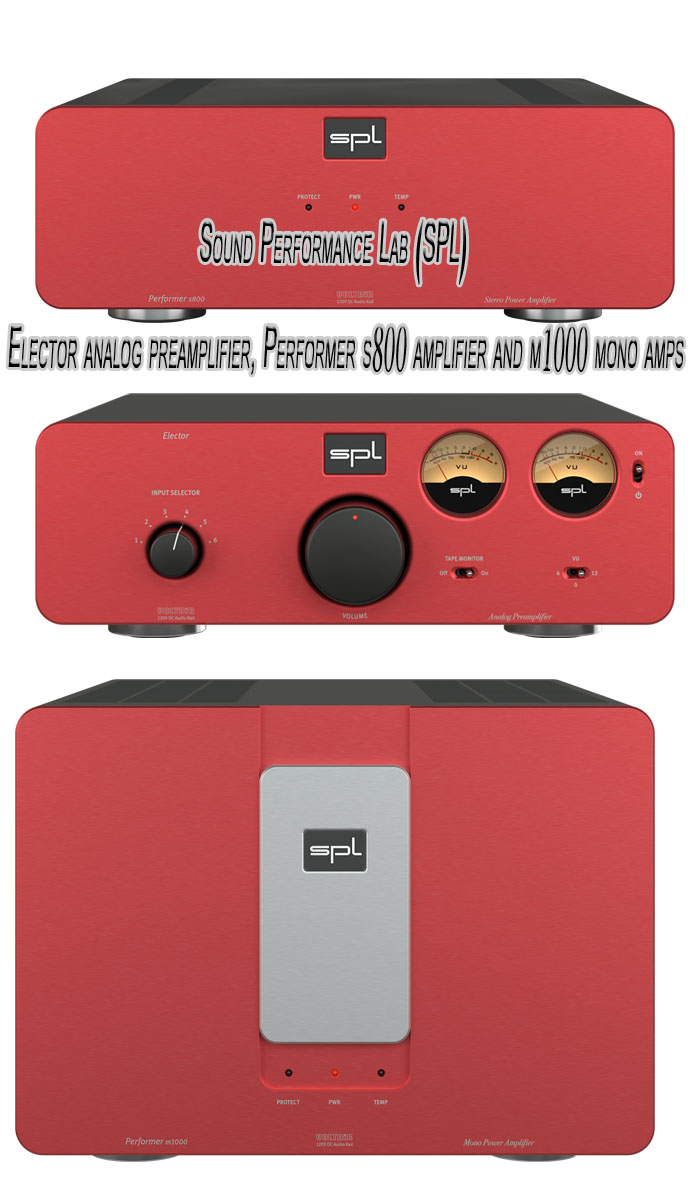
 About a year ago, I was looking for an inexpensive, truly balanced preamplifier to use in one of my smaller systems. During my investigations, I came across a 2010 Six Moons review by Joel Chevassus that raved about a preamplifier from the German company Sound Performance Labs (SPL), called the Volume2 controller. He described its performance as “a sensation of being directly connected to the recording as though being present during the recording itself, but never turning clinical, but offering great neutrality.” Mr. Chevassus also compared the performance of the Volume2 linestage very favorably with other preamplifiers that sold for four to six thousand dollars more. Here’s the punch line: Volume2 retails for $650. I bought a used one on US Audio Mart for a whopping 200 dollars!
About a year ago, I was looking for an inexpensive, truly balanced preamplifier to use in one of my smaller systems. During my investigations, I came across a 2010 Six Moons review by Joel Chevassus that raved about a preamplifier from the German company Sound Performance Labs (SPL), called the Volume2 controller. He described its performance as “a sensation of being directly connected to the recording as though being present during the recording itself, but never turning clinical, but offering great neutrality.” Mr. Chevassus also compared the performance of the Volume2 linestage very favorably with other preamplifiers that sold for four to six thousand dollars more. Here’s the punch line: Volume2 retails for $650. I bought a used one on US Audio Mart for a whopping 200 dollars!
 SPL has been a very innovative and highly regarded manufacturer of pro electronics for recording studios for over thirty years. About six years ago, they started to design preamplifiers, DACs, and amplifiers for the high-end audiophile market. Based on reading many reviews in respected European audio journals, the consensus was that SPL’s audiophile gear was beautifully built, used innovative designs, offered reference-level performance. The pricing was very reasonable compared to other German and Swiss companies such as Goldmund Audio, Soulution Audio, Accustic Arts, T+A Elektroakustik, and FM Acoustics LTD. There was also much discussion on European based audio chat rooms and blogs by high-enders raving about how they loved their SPL gear and had saved so much money but did not give up any performance to the much higher priced pieces.
SPL has been a very innovative and highly regarded manufacturer of pro electronics for recording studios for over thirty years. About six years ago, they started to design preamplifiers, DACs, and amplifiers for the high-end audiophile market. Based on reading many reviews in respected European audio journals, the consensus was that SPL’s audiophile gear was beautifully built, used innovative designs, offered reference-level performance. The pricing was very reasonable compared to other German and Swiss companies such as Goldmund Audio, Soulution Audio, Accustic Arts, T+A Elektroakustik, and FM Acoustics LTD. There was also much discussion on European based audio chat rooms and blogs by high-enders raving about how they loved their SPL gear and had saved so much money but did not give up any performance to the much higher priced pieces.
My experience with the Volume2 preamplifier and the above-stated information intrigued me to pursue contacting the U.S. importer of SPL, Focal Naim America, to set up this review. I worked with both Wendy Knowles and Will Veber to bring in a full “loom” of SPL equipment for this project. The Elector analog preamplifier retails for $2,599, the Performer s800 stereo chassis amplifier retails for $3,299, and the Performer m1000 monoblock amplifier retails for $8,598 a pair.
Here’s a brief description of each of the above-stated pieces of gear:

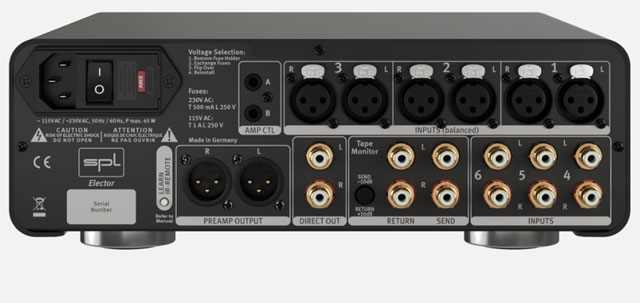
The Elector preamplifier has a pair of VU meters on the upper right side of its faceplate. On the right of the VU meters is a standby switch. Underneath the VU meters sit two small switches, VU gain for the meters, and a tape monitor input. The middle is a large volume control that is a pleasure to use because of its silky-smooth/firm action when not using the remote control. On the left is the input selector switch. Around the back, there are pairs of both XLR and RCA inputs/outputs. All the demo pieces I was sent were clad in a black chassis. However, they also can be ordered either in silver or red.
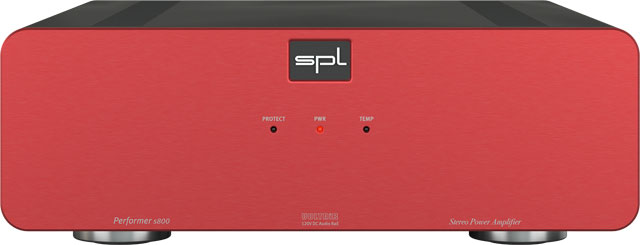
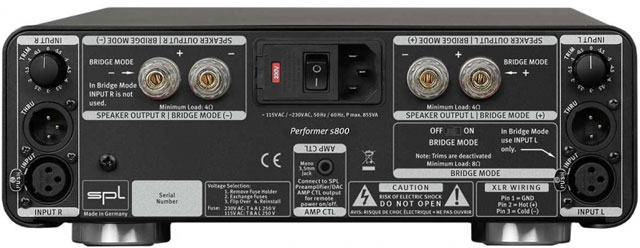
 The Performer s800 stereo amplifier has a center SPL badge on its faceplate with three small LEDs underneath it. One LED lets you know that the amplifier is on. The other two LEDs monitor the temperature and DC protection of the unit. Around the back, there is a pair of high-quality, gold-plated speaker cable connections, along with gain switches for each channel and XLR inputs. The s800 amplifier is an A/B design. It will provide 185 watts-per-channel into 8 Ohms and 285 watts into 4 Ohms.
The Performer s800 stereo amplifier has a center SPL badge on its faceplate with three small LEDs underneath it. One LED lets you know that the amplifier is on. The other two LEDs monitor the temperature and DC protection of the unit. Around the back, there is a pair of high-quality, gold-plated speaker cable connections, along with gain switches for each channel and XLR inputs. The s800 amplifier is an A/B design. It will provide 185 watts-per-channel into 8 Ohms and 285 watts into 4 Ohms.
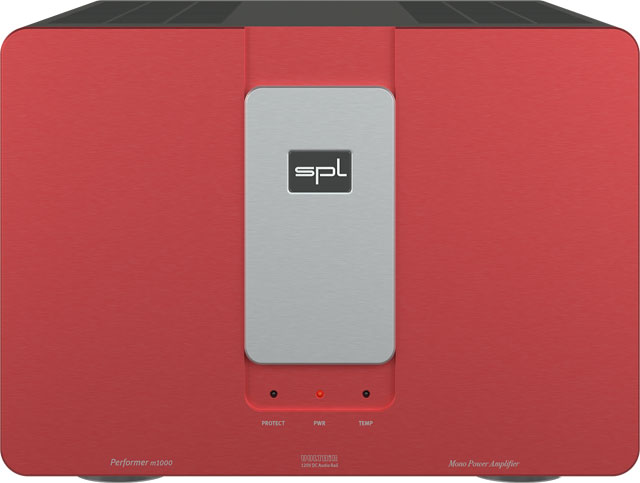
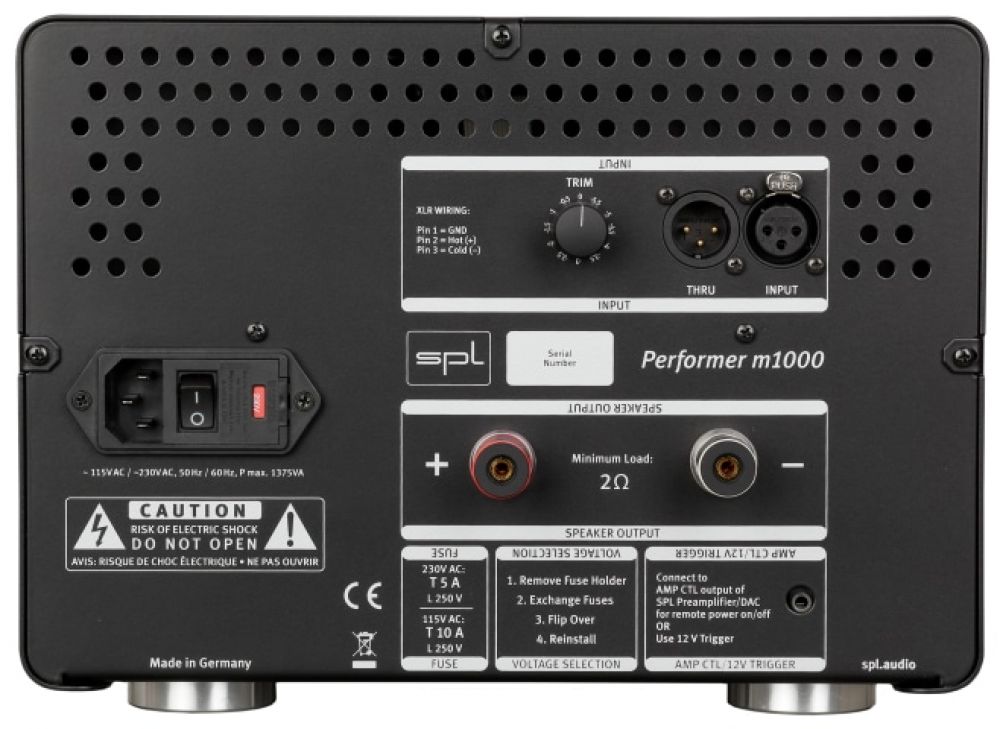
The Performer m1000 monoblock amplifiers have a unique aesthetic function. In the middle of the amplifier’s face plate there is a shallow trough that allows you to pick either a red, black, or sliver face plate, which you insert into the faceplate to customize your amplifier. Underneath this faceplate is the same three LEDs found on the stereo s800 amplifier that monitor on/off, temperature, and DC protection mode. Around the back, there are the same high-quality gold-plated speaker cable connections, gain switches and XLR inputs that you found on the s800 model. On the sides of the m1000 monoblocks, internally housed in the chassis, are a trio of very quiet high-speed cooling fans. However, regardless of the load or dB levels, I was never able to engage these fans. Both the s800 and m1000 amplifiers are very cool running designs. The m1000 monoblock amplifier is an A/B design. These monoblocks will provide 420 watts into 8 Ohms, 750 watts into 4 Ohms, and 1000 watts into 2 Ohms.
 All of the SPL pieces described above are based on a proprietary design called VOLTAiR technology, which operates on an unrivaled +/- 60-volt loading compared to the standard +/- 15-volt loading. This is four times the voltage of standard audio electronics. This leads to phenomenal measurements such as 1) Headroom range of over 33.2dB. 2) Dynamic range of 141.4dB. 3) Less noise range of 114.2dB. It is a well-known fact that the relationship between objective measurements and subjective pleasure from a piece of stereo equipment is not a one to one correlation. A historical example would be the Halcro amplifiers that had some of the best measurements of their time, yet were some of the most unpleasant, artificial, and non-musical sounding amplifiers I have ever had the displeasure of listening to in many systems.
All of the SPL pieces described above are based on a proprietary design called VOLTAiR technology, which operates on an unrivaled +/- 60-volt loading compared to the standard +/- 15-volt loading. This is four times the voltage of standard audio electronics. This leads to phenomenal measurements such as 1) Headroom range of over 33.2dB. 2) Dynamic range of 141.4dB. 3) Less noise range of 114.2dB. It is a well-known fact that the relationship between objective measurements and subjective pleasure from a piece of stereo equipment is not a one to one correlation. A historical example would be the Halcro amplifiers that had some of the best measurements of their time, yet were some of the most unpleasant, artificial, and non-musical sounding amplifiers I have ever had the displeasure of listening to in many systems.
In this case, Sound Performance Lab’s designers and engineers have figured out something with their proprietary VOLTAiR technology because the “house sound” of their preamplifier and amplifiers offers some of the finest overall musicality that I have heard in solid-state gear. I’ll share the details about their performance when I get into specific musical selections to highlight their sonic strengths in the next section of this review. All three SPL pieces offer three very apparent characteristics that lead to an overall beautiful/relaxing musical experience for the listener. An overall silky-smooth presentation that rivals the grainlessness of the best tube-based gear. A top to bottom balance where all frequencies are woven together in a natural, seamless manner. They also offer great overall macro-dynamics that give the music the drive and pop to get your foot tapping to the music’s beat.
When I cued up my first selection, arranger Marty Paich’s, “The Picasso of Big Band Jazz,” recorded at a reference level in 1957 in California, two aspects of this wonderfully recorded and played big-band jazz stood out. The SPL Elector preamplifier and either the s800 or m1000 amplifiers created a crystal-clear presentation that allowed all the micro-details to shine through and be on full display on a vast, layered soundstage. The SPL combo was also terrific at casting the gorgeous colors and timbres of the individual instruments. The only reason I would not be completely fooled that I was not listening, based on the beautiful tonality and image density, to world-class tube gear, was the overall noise floor was non-existent compared to any vacuum tube-based system I have ever heard.
 I use the album, “For Once in My Life,” by B3 Hammond organ player Ben Paterson for getting at a preamplifier or amplifier’s ability with deep extended bass frequencies, overall speed, and how they handle the splash of the drummer, George Fludas, use of cymbals during his solos. Regardless of what digital front end or speakers I had in the system when reviewing the SPL combo, the bottom end extension, power, and tautness was easily heard through these different combinations. The top-end “splash” of the cymbals that would float away as a natural decay stayed constant with the four other speaker models, which have great natural fiber/silk dome tweeters.
I use the album, “For Once in My Life,” by B3 Hammond organ player Ben Paterson for getting at a preamplifier or amplifier’s ability with deep extended bass frequencies, overall speed, and how they handle the splash of the drummer, George Fludas, use of cymbals during his solos. Regardless of what digital front end or speakers I had in the system when reviewing the SPL combo, the bottom end extension, power, and tautness was easily heard through these different combinations. The top-end “splash” of the cymbals that would float away as a natural decay stayed constant with the four other speaker models, which have great natural fiber/silk dome tweeters.
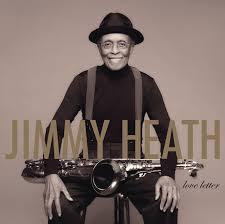 The jazz community recently lost one of the great tenor saxophone players from the bebop era, Jimmy Heath. His last recording, “Love Letters,” is an intimate collection of beautiful ballads that showcase Mr. Heath’s ability to convey powerful, heartfelt emotions on his tenor and soprano saxophones. The SPL combo was able to get to the essence of his feelings/emotions during his playing in two ways. First, they render the music with overall liquidity that allows you to relax into the music’s mood. Secondly, they are so transparent that every nuance and inflection of Heath’s playing was conveyed in a crystal clear yet natural manner.
The jazz community recently lost one of the great tenor saxophone players from the bebop era, Jimmy Heath. His last recording, “Love Letters,” is an intimate collection of beautiful ballads that showcase Mr. Heath’s ability to convey powerful, heartfelt emotions on his tenor and soprano saxophones. The SPL combo was able to get to the essence of his feelings/emotions during his playing in two ways. First, they render the music with overall liquidity that allows you to relax into the music’s mood. Secondly, they are so transparent that every nuance and inflection of Heath’s playing was conveyed in a crystal clear yet natural manner.
After spending many delightful hours listening to the Elector preamplifier with either the s800 single-chassis and m1000 monoblocks, I came to the following conclusion: Even though I found either pairing a delight to listen to, please remember the m1000 monoblocks are terrific in the ways I described above, I found the smaller single-chassis s800 to have a “smidgeon” more of warmth/intimacy and three-dimensional imaging than it’s extremely powerful big brother monoblocks. One of my favorite solid-state amplifiers is the Pass Labs XA-25 because of the density of tonal colors, its effortless presentation, and its ability to create “meat on the bones” imaging. I kept thinking about what the SPL s800 reminded me the most of in my collection of amplifiers. Then it dawned on me; it was the wonderful Pass Labs XA-25. However, now add on a lower noise floor, unlimited power to drive virtually any speaker, and more extended/deeper/tauter bass frequencies.
I hope it is apparent with what I shared and described in the review that I was mightily impressed with SPL’s Elector preamplifier and both the s800 and m1000 amplifiers. The physical appearance of all the pieces is quite attractive; the build quality and engineering live up to what you expect from a high-level German company. Now, add on the list of sonic superlatives such as a grainless silky-smooth overall presentation, quick, powerful macro-dynamics and speed, seamless integration of all frequencies from top to bottom, and rendering of tube-like timbres and image density. I believe the combo of the Elector preamplifier and s800 stereo amplifier is one of the great bargains in high-end audio. At their total retail price of $5,898, which is not inexpensive, these two pieces get you to a level of performance that competes with far more expensive pieces of equipment.
One final comment, my dear friend Mike Kay, owner of the highly regarded store Audio Archon, heard me rave about the SPL s800 amplifier to the point that he wanted me to ship it to him so that he could come to his conclusions regarding its performance in the context of his systems. Because of what he experienced regarding sonic performance, build quality, and the very reasonable pricing for an imported German product, he signed up to be a retail dealer. How’s that for an endorsement?


terry london
Terry’s Associated Equipment
Sources:
Mhdt Lab Balanced Pagoda
Threshold DAC-1
Rockna Wavelight DAC
Bricasti Design M3 DAC
Jay’s Audio MK-II CD transport
CEC MK-II CD transport
Amplification:
Coda FET 07x preamplifier
Coda # 16.0 amplifier
Pass Labs XA-25 amplifier
Threshold 550e amplifier
Triode Labs SET 2A3 amplifier
AricAudio Motherlode MK II reference preamplifier
Linear Tube Audio reference preamplifier
Loudspeakers:
Tekton Design Ulfberth & Perfect SET
NSMT Model 100
LSA reference
Accessories:
Full Loom of Black Cat Cables-Coppertone & Digit 110 AES/EBU-3202 XLR interconnects-3232 speaker wire
Kirmuss Adrenaline speaker wire
Krolo Design reference rack & footers
Puritan Audio Labs conditioner
Audio Archon power cords
Specifications:
Price: $2,599.00
Elector Preamplifier
Inputs and Outputs
Analog inputs
6 analog stereo inputs
3 x XLR, balanced (10 k Ohm)
3 x RCA, unbalanced (47 k Ohm)
Max. input level: +32,5 dBu
Outputs
2 analog stereo outputs
Neutrik XLR, balanced, Pin 2 = (+)
RCA, unbalanced (Direct Out)
Impedance: 75 Ohms (balanced)
max. output level 32,5 dBu
Dimensions (incl. feet)
278 mm W x 100 mm H x 337 mm D
10.95 in W x 3.94 in H x 13.27 in D
Weight
4.25 kg; 9.37 lbs (unit only)
5.4 kg; 11.9 lbs (shipping)
s800 Stereo Amp
Price: $3,299
Line Inputs & Line Outputs
Neutrik XLR, balanced, Pin 2 = (+)
Input impedance: 10 k Ohms
Input trimming: 0 dB to -5.5 dB in 0.5 dB steps
Input sensitivity: +6 dBu
Output impedance (Slave Thru) is defined by the connected device
Crosstalk: -110 dB (@1 kHz)
Speaker outputs
2 pairs binding posts with ø4 mm cable hole (screwable) and banana plug; fully encapsulated
Output power
Power supply
Mains voltage: 230 V AC / 50 Hz; 115 V AC / 60 Hz
Fuses: 230 V: T 4 A; 115 V: T 8 A
Power consumption: max 900 VA
Idle power consumption: 40W
Standby power consumption: 0.3 W
Dimensions (incl. feet)
(WxHxD) 10.94 x 3.94 x 13 in (278 x 100 x 330 mm)
Weight
28.22 lbs (12.8 kg), unit only
30.87 lbs (14.0 kg), shipping
m1000 Monoblock Amp
Price: S8,598.00
Line Input & Line Output
Neutrik XLR, balanced, Pin 2 = (+)
Input impedance: 10 k Ohms
Input trimming: 0 dB to -5.5 dB in 0.5 dB steps
Input sensitivity: +6 dBu
Output impedance (Slave Thru) is defined by the connected device
Speaker output
1 pair gold-plated binding posts with ø4 mm cable hole (screwable) and banana plug; fully encapsulated
Output power (Sine at 1kHz)
1000W into 2 Ohm
750W into 4 Ohm
420W into 8 Ohm
Dimensions (incl. feet)
(WxHxD) 10.94 x 8.07 x 14.76 in (278 x 205 x 375 mm)
Weight
54.67 lbs (24.8 kg), unit only
64,60 lbs (29,3 kg), shipping
Address:
SPL electronics GmbH
P. O. Box 1227
41372 Niederkruechten
Germany
Tel.: +49 (0) 2163 9834-0
Fax: +49 (0) 2163 9834-20
Email: info@spl.audio
Website: https://spl.audio/en/
US Distributor
Focal Naim
Website: www.focalnaimamerica.com
Email: ordersus@focal-naim.com
Tel.: +1 (866) 271 5689
Stereo Times Masthead
Publisher/Founder
Clement Perry
Editor
Dave Thomas
Senior Editors
Frank Alles, Mike Girardi, John Hoffman, Russell Lichter, Terry London, Moreno Mitchell, Paul Szabady, Bill Wells, Mike Wright, Stephen Yan, and Rob Dockery
Current Contributors
David Abramson, Tim Barrall, Dave Allison, Ron Cook, Lewis Dardick, Dan Secula, Don Shaulis, Greg Simmons, Eric Teh, Greg Voth, Richard Willie, Ed Van Winkle, and Rob Dockery
Music Reviewers:
Carlos Sanchez, John Jonczyk, John Sprung and Russell Lichter
Site Management Clement Perry
Ad Designer: Martin Perry




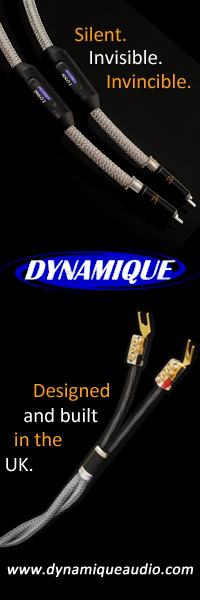

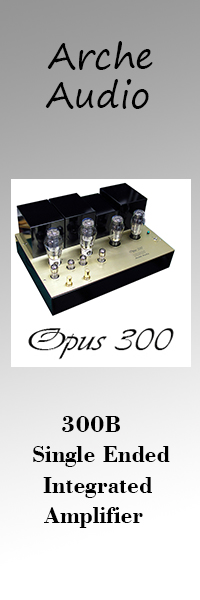
Be the first to comment on: Sound Performance Lab (SPL) Elector preamp /Performer s800 amplifier and m1000 monos by Terry London